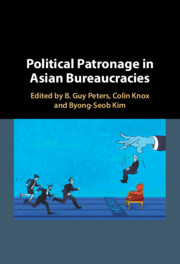Book contents
- Political Patronage in Asian Bureaucracies
- Political Patronage in Asian Bureaucracies
- Copyright page
- Contents
- Figures
- Tables
- Contributors
- Abbreviations
- 1 Patronage in Asian Political Systems
- Part I One-Party Dominated Systems
- Part II Two-Party/Multi-Party Systems
- Part III Autocracies
- 10 Varieties of Patronage in a Single-Party State
- 11 Party Patronage in Kazakhstan
- 12 Political Patronage in Vietnam
- 13 Political Patronage in Asian Bureaucracies
- Index
- References
10 - Varieties of Patronage in a Single-Party State
Ministers in China
from Part III - Autocracies
Published online by Cambridge University Press: 05 October 2023
- Political Patronage in Asian Bureaucracies
- Political Patronage in Asian Bureaucracies
- Copyright page
- Contents
- Figures
- Tables
- Contributors
- Abbreviations
- 1 Patronage in Asian Political Systems
- Part I One-Party Dominated Systems
- Part II Two-Party/Multi-Party Systems
- Part III Autocracies
- 10 Varieties of Patronage in a Single-Party State
- 11 Party Patronage in Kazakhstan
- 12 Political Patronage in Vietnam
- 13 Political Patronage in Asian Bureaucracies
- Index
- References
Summary
Extant literature on Chinese elite politics tend to argue that Chinese officials work under a political system very different from a western-Weberian bureaucracy. Factional patron-client relationship is considered a dominant factor affecting political appointment of high-level officials. However, prior findings have been mainly based on governors of provincial or prefectural jurisdictions or central committee members. State Council ministers and vice-ministers are largely missing in the previous analysis. Our research examines State Council ministers and vice-ministers under the administration of President Xi Jinping. This high-level bureaucrat group arguably is most comparable to the political appointees in Weberian bureaucracies. We systematically analyze their types of patronage along the policy-politics divide and loyalty basis. We also bring in the dimension of expertise to further identify the extent of professionalization of Chinese ministers. We find a variety of patronage existing among Chinese ministers. Political loyalty is only one kind of the patronage affecting personnel configurations of the State Council.
Keywords
- Type
- Chapter
- Information
- Political Patronage in Asian Bureaucracies , pp. 231 - 259Publisher: Cambridge University PressPrint publication year: 2023

